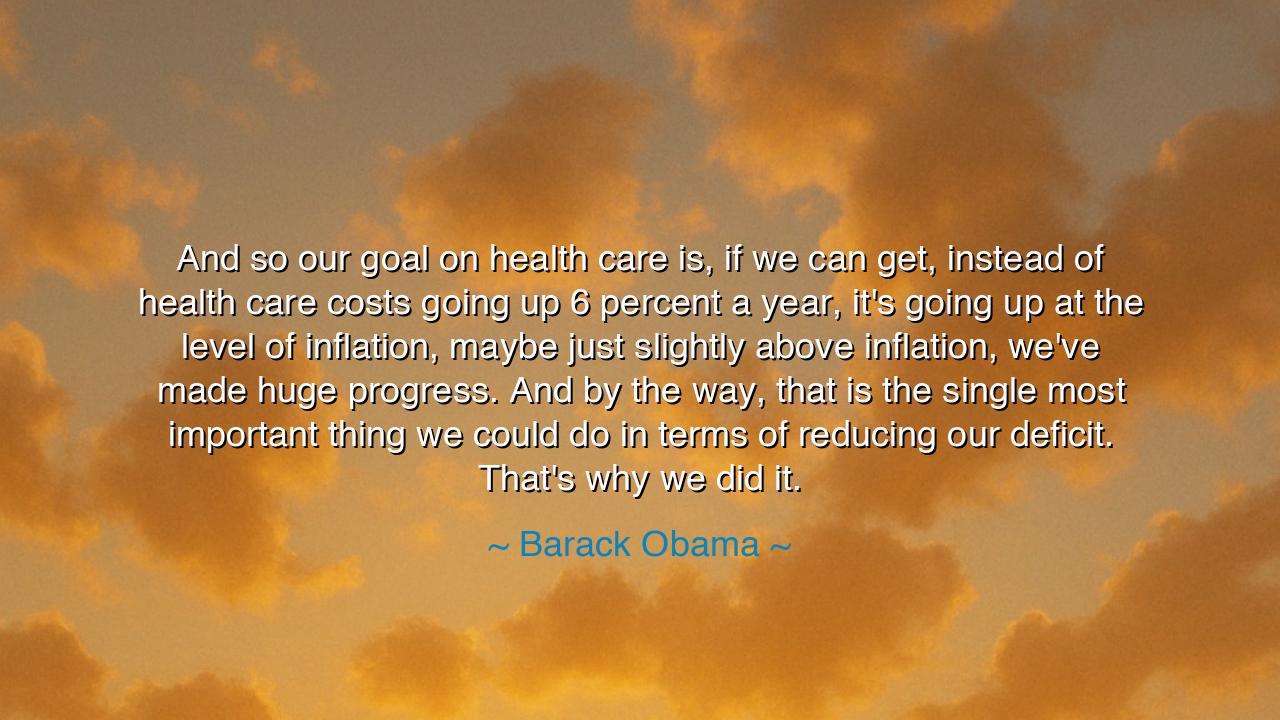
And so our goal on health care is, if we can get, instead of
And so our goal on health care is, if we can get, instead of health care costs going up 6 percent a year, it's going up at the level of inflation, maybe just slightly above inflation, we've made huge progress. And by the way, that is the single most important thing we could do in terms of reducing our deficit. That's why we did it.






On the Wisdom of Balance and the Healing of Nations: The Teaching of Barack Obama
Hear the words of Barack Obama, who once said: “And so our goal on health care is, if we can get, instead of health care costs going up 6 percent a year, it’s going up at the level of inflation, maybe just slightly above inflation, we’ve made huge progress. And by the way, that is the single most important thing we could do in terms of reducing our deficit. That’s why we did it.” These words may sound like the language of policy, yet beneath them lies the ancient wisdom of balance—the truth that no kingdom, no people, no family can endure if it does not learn to heal its body while guarding its treasure. Obama spoke not merely as a leader of a nation, but as a keeper of order between compassion and prudence, between the healing of the people and the strength of the state.
In the long sweep of history, many rulers have learned this lesson too late. Empires have crumbled not only from the swords of their enemies but from the sickness of their own people and the burden of their own debts. A wise leader sees that health is not merely the absence of illness, but the foundation of a nation’s vitality; that economy is not merely wealth, but the measure of stewardship. Obama’s words were born from a time when the American people faced the rising cost of care, when families were crushed by medical bills, and the nation’s deficit swelled like a wound left untended. His goal was not only to heal the body of the nation, but to restore balance to its heart.
To understand his vision, one must remember the creation of the Affordable Care Act, a labor born of struggle and division. Like the reformers of old who dared to challenge entrenched powers, Obama and his allies sought to bring forth a system where the sick might be healed without being broken by cost. Yet the resistance was fierce, for change threatens those who profit from chaos. Still, the work was done—not in perfection, but in persistence. He knew that progress is not a thunderclap but a steady flame, that to make health care costs rise no faster than inflation was not a dream of numbers, but a promise of endurance.
So too did the ancients understand that sustainability is the essence of wisdom. The Greeks spoke of sophrosyne—the virtue of moderation, the harmony between desire and discipline. When a society consumes more than it can replenish, when it feeds on its future to satisfy its present, it begins its slow decline. In the same way, when the costs of healing rise beyond what the people can bear, when care becomes a luxury rather than a right, the soul of the nation sickens. Obama’s words, humble yet firm, were a call to restore this sacred balance—to make compassion sustainable, and responsibility compassionate.
Think, then, of the story of Emperor Ashoka of India, who once ruled with conquest and fire, but upon seeing the suffering his wars had caused, turned his empire toward healing. He built hospitals for both humans and animals, and decreed that his kingdom should be governed not by force, but by care. His transformation did not weaken his realm—it strengthened it. In that spirit, Obama’s pursuit of controlled health care costs was not an act of austerity, but of preservation—a way to ensure that the blessings of care might last for generations, rather than be consumed in a single age of excess.
The lesson is thus: progress is not always in expansion, but in restraint. The greatest leaders are not those who build endlessly, but those who know when to balance, when to pause, when to heal. In our own lives, this wisdom holds true. If our efforts rise too fast—our spending, our ambitions, our appetites—they outstrip the rhythm of our strength, and we fall into exhaustion. But if we learn to let our growth move with the pace of inflation, that is, in harmony with what we can sustain, we build foundations that will not crumble.
So, O listeners and seekers of truth, take this teaching into your own heart: Guard your health as you would your fortune, and guard your fortune as you would your health. When you seek prosperity, remember that its root is well-being. When you seek healing, remember that it must be shared wisely. A nation, like a person, thrives when its compassion is disciplined, and its discipline compassionate. As Obama said, the true work is not only to rise, but to rise rightly—to progress not through frenzy, but through wisdom. For in the steady balance between heart and reason lies the enduring strength of all great civilizations.






AAdministratorAdministrator
Welcome, honored guests. Please leave a comment, we will respond soon